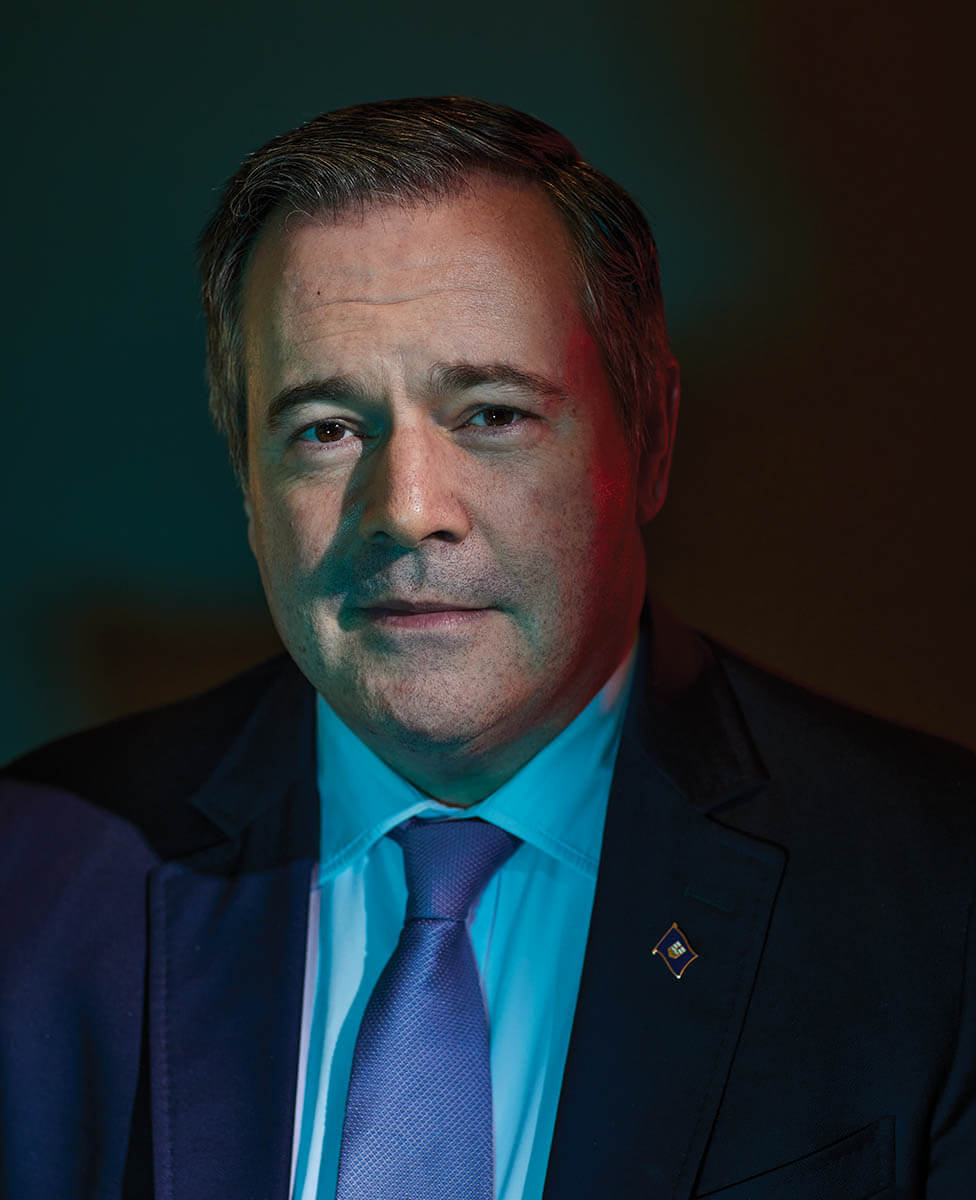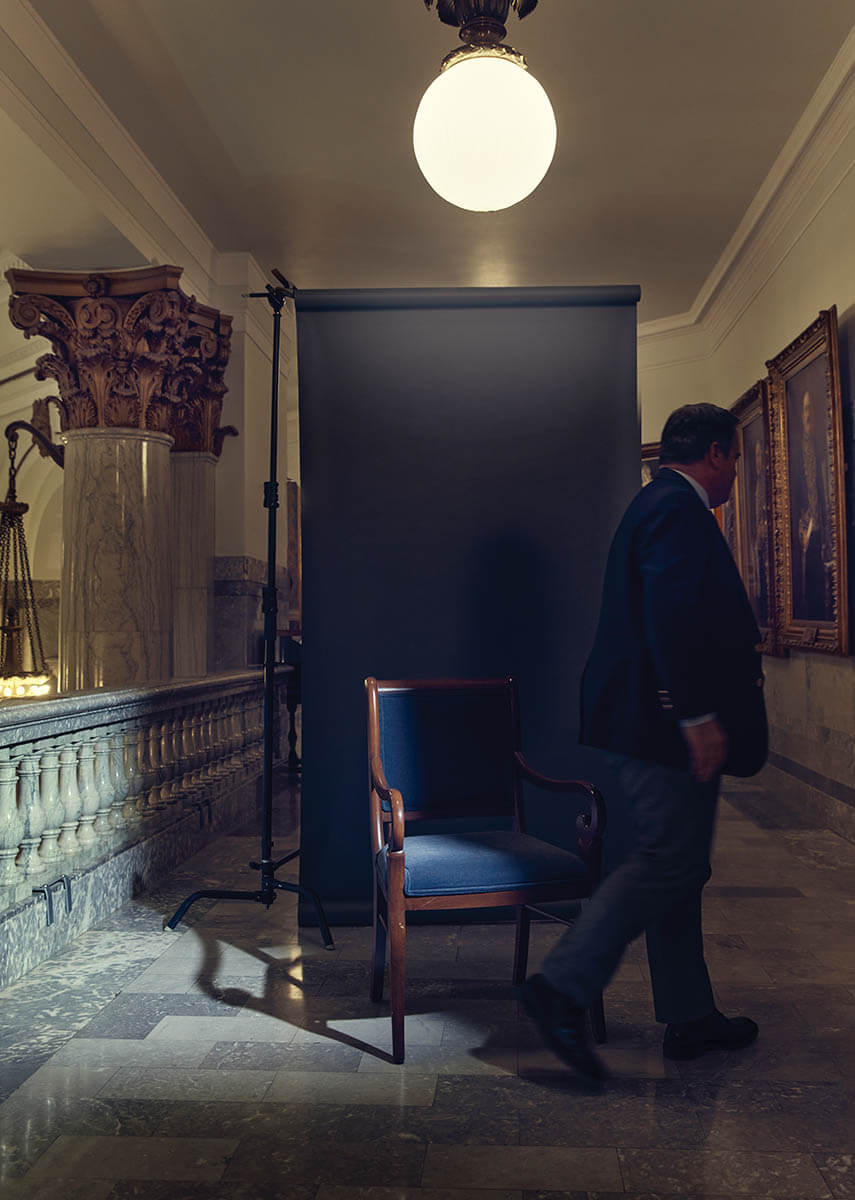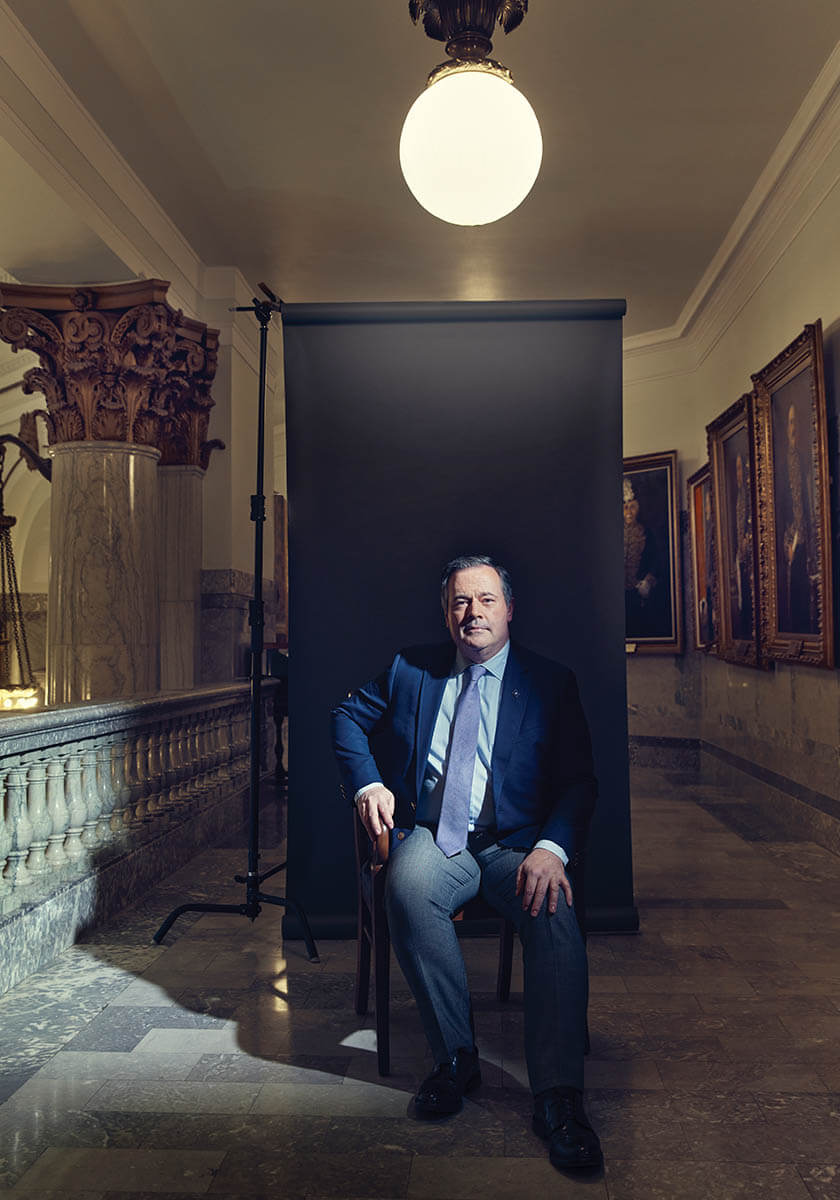
I watch Premier Jason Kenney awkwardly pose during the photo shoot for this article. The photographer asks, “Is there any other way you’d like to sit that’s more comfortable in the chair?” The art director suggests he does something natural with his hands; they’ve been resting clenched on his lap. His smile lacks genuineness. His mind must be somewhere else — maybe on the upcoming leadership review, which, when this photo shoot happens, is less than a month away in April. Kenney doesn’t know it yet, but he will get barely more than 50 per cent support of his party’s membership — and this will lead him to announce his intention to resign as leader of the Tories.
I think, Finally, someone who’s worse at getting their picture taken than me.
Kenney tries to lighten the mood with a joke about how if he’d known the photo shoot would be so professional, he “would’ve worn a fresh shirt.” The joke doesn’t land, but his nearby staffers laugh politely.
In this moment, though I’ve found many of his policies repugnant for how they attacked or neglected queer and racialized folks and those with disabilities, I start to sympathize with him. I think that, like me, he must experience a lot of anxiety.
I’m afraid of failing and letting people down — and my work as a bookshop owner and freelance writer has nowhere near as fatal of consequences as being the premier of a province could. Over two years into a pandemic, I’m afraid of catching COVID and being stuck with the various effects of long COVID. I’m afraid that the gentle queer kids who are looking for safe spaces to explore and understand their identities will never be able to grow into and celebrate their true selves. I’m afraid of how climate change will affect our world; an August 2021 report from IPCC says the Earth’s average surface temperature has increased by 1.1 degrees Celsius over the past century due to greenhouse gas emissions. But, our government invested $1.5 billion (and lost) on the now-cancelled Keystone XL pipeline.

Kenney first entered political service in 1997 as a federal MP for the Calgary Southeast riding, where he served in various cabinet positions under then-prime minister Stephen Harper until 2015.
“I was quite exhausted from 19 years in the federal parliament, and, in 10 of those years in the Harper government, leading often multiple ministries at the same time,” says Kenney. “That three-month 2015 federal election campaign was especially gruelling for me. I was done. I just wanted to leave politics. I wanted to have a normal life, by which I mean have a job where you could have your weekends and evenings off occasionally.”
Though the Tories lost the 2015 election, Kenney won the race in Calgary Midnapore with ease, earning 66.7 per cent of the votes from 63,562 eligible ballots cast. He left the MP role in 2017, after which his Conservative replacement, Stephanie Kusie, got more than 77 per cent of the vote in the byelection.
At that point in his life, Kenney was burned out. Instead of the rest he needed, he turned his mind to Alberta politics and worked late hours developing a plan to unite the provincial conservative parties.
“I thought that somebody who did not have baggage, who wasn’t part of the bitter division between the PCs and the Wild Rose, would be in a good position to try to reunite that traditional coalition,” Kenney says. “I went to other people to ask them to do the same thing, like [former fellow federal cabinet minister and interim leader of the Tories] Rona Ambrose. I couldn’t find anybody else to do it. So, eventually, I looked in the mirror.”
By taking on a job he says he never wanted, Kenney continued to exhaust himself.
I can relate. In my pandemic solitude, I avoided my emotions, buried myself in my work, and tied my self-worth to my productivity. I ignored Zoom chat requests from friends and became a bookstore owner who stopped reading for joy.
Kenney tells me he came from a musical family: “I played piano up to Grade 8 in the Royal Conservatory Music Piano program. When I get a chance, I’d like to get back to that, but my playing skills have atrophied over the years.”

In 2012, Kenney told his Twitter followers that Loreena McKennitt was one of his piano teachers, and he remains a fan of the Juno winner and Grammy nominee. (McKennitt is well known for supporting environmental causes and programs that nurture young artists. She is a member of the Order of Canada.)
Kenney says that he’d like to reconnect with friends too — it’s been difficult with his busy schedule and the pandemic.
Kenney is comfortable telling people what they want to hear — “We’re getting the economy back on track;” “We’re going to cut spending” — and has a blue pickup truck, which appeals to rural Albertans. I too am a people pleaser. Despite desiring to wear more jewellery and feminize my appearance, I wear traditionally masculine outfits to pacify heteronormative folks who may become upset by seeing me dress as queer as I truly want.
It’s challenging to break through patterns when you’re worried about upsetting someone. For Kenney, it’s had dire consequences as he’s tried to appease the anti-vax and anti-restriction voters. He greenlit some of the most lenient COVID measures in the country. Kenney claims that Alberta has a “significantly lower per capita COVID death rate than Canada,” but according to covid19tracker.ca, the province is third highest in the country with 103.33 deaths per 100,000 people. Furthermore, the per capita COVID death rate is less than half of Alberta’s in five provinces and territories.
There were 4,591 COVID-related deaths in the province as of the writing of this piece. But, protesters have taken to the streets, often in their own Ford trucks (and Rams and Silverados, too) dripping with Canadian (and at least one Nazi) flags, to honk incessantly and demand more freedoms. This wing of Conservative support voted against Kenney en masse in the leadership review.
When overwhelmed at work, I make mistakes, and would be better served admitting I’m wrong rather than being so defensive. Everyone who I talked to about this interview in advance told me to expect this response from Kenney more than once: “I reject the premise of the question.”
In the summer of 2021, the Alberta government lightened restrictions and ran with the most audacious slogan: “Best Summer Ever.” It turned out to only be the best summer for COVID as daily case counts jumped from 230 on August 1 to 1,315 on September 1. When Albertans looked to their leadership for guidance during this time, Kenney was nowhere to be seen for 23 days as the pandemic worsened.
The government further de-prioritized COVID in March 2022, when it dropped almost all restrictions — including masking and limiting social gatherings. As of publication, no measures have been put back in place despite COVID wastewater levels remaining high. At the January 2022 peak, Alberta statistics indicated there were 595.76 copies of the virus per mL of wastewater in Edmonton, while the most recent peak in May was 356.21 copies per mL of water. Compare these numbers to the height of the September 2021 wave, which peaked at only 151 copies per mL of water.
As everything collapses around you, you keep working harder to try to keep up — not realizing that you’re perpetuating the habits that are failing you. I’ll stay up late responding to emails, skip therapy appointments, work longer days to keep on top of my lengthening to-do list — everything except give my body the rest it needs to think clearly. You keep repeating the same mistakes: hope trickle-down economics works, pray that oil prices surge before next budget, try reducing restrictions — hoping this time won’t lead to a rise in cases again.
Kenney says to me, “My deepest and most abiding commitment is a belief in human dignity.” Among the first policies Kenney and the UCP put through was to de-index AISH payments. Giving less money every month to people with disabilities, on top of rising inflation costs, does not help them live with dignity. Likewise, the UCP government closed a supervised consumption site in Lethbridge, despite Alberta breaking its record for drug overdose deaths, with more than 1,700 in 2021.
I grew up in Medicine Hat — a conservative stronghold for as long as I lived there — and, although I was aware of my queerness, I believed I could live a fine enough life without a partner or exploring my sexuality. More honestly, I was afraid of giving in to my desires because I was more worried about how other people would react.
I never had the opportunity to join a GSA in high school. It would have helped me accept myself sooner. However, I would have been too terrified to join if I knew my parents could potentially find out. In November 2017, the NDP passed Bill 24, which prohibited schools from telling parents if their child joined a GSA. One of the first bills the UCP passed took away this protection and made it harder for students to access GSAs, as principals no longer had to immediately approve a student’s request to start one. Defending the change back in 2019, Kenney claims that Alberta still has the strongest legal protections for GSAs of all provinces and tries to placate students’ fears of being outed. “I think it would be very rare. Probably only dealing with very young kids or kids with unique emotional and mental health challenges.”
However, when NDP Women and LGBTQ2S+ Issues Critic Janis Irwin spoke to a rural GSA in late 2021, she saw the fear in students. She says, “The kids didn’t even want to turn their cameras on because they were so fearful that because I was associated with government, that somehow their parents may find out that they were a part of a GSA.”
In these unprecedented times that merge an ongoing pandemic, climate crisis, and rising cost of living due to inflation, we need brave leaders who are willing to admit mistakes, who don’t avoid pressing challenges, who don’t off-load blame on members of their staff or other levels of government. This will be the challenge going forward in a province where no leader has survived to see a full second term in office since Ralph Klein left in 2006. We need a leader who will address inflation, as it hit a whopping 6.7 per cent in March. So far, Kenney paused the provincial gas tax, calling it “a pretty substantial step that shows we understand what people are going through in terms of the cost
of living.”
Alberta needs a leader who will be vulnerable, listen, and guide us out of this anxious cycle of boom and bust.
When I interview Kenney, he admits he’d welcome a new job. “I don’t need this job for self-fulfillment or anything else. I never entered this phase of my provincial political service thinking that this would be a long [period],” says Kenney. “I was in the federal parliament for 19 years. I will not be in the Alberta legislature for anything like that duration… And so, yes, I would love to have an opportunity to go and do challenges outside of formal public service, of elected politics.”
Despite his yearning to move on, Kenney fought hard to win the leadership vote, granting media interviews — like this one — and launching his own weekly radio show, Your Province. Your Premier, on 770 CHQR and 630 CHED to win over voters. Anxious folks often do the easy thing: We hold on to our present situation and responsibilities because we’re afraid of what new challenges may bring. Even if we’re stuck doing something we don’t want to do, we’re too anxious to make the change to improve our lives.
Kenney claimed he’d stay on as leader with the slimmest of majorities, and received just that with 51.4 per cent of the leadership-review vote. He committed to unite the right, but the results of his leadership review reveal it’s as divided as ever. And despite his earlier claim to hang on, Kenney shocked Albertans by offering his plan to resign — a vulnerable act that perhaps relieved Kenney of the job he never truly wanted. Except he didn’t say when.
He then reached into George Costanza’s bag of tricks: say he’s quitting but still show up to work the next day. His current plans are to stay until the UCP elect a new leader.
UCP MLA for Fort McMurray- Lac La Biche and former Wildrose leader Brian Jean has gone on record to say, “It would be parliamentary tradition for [Kenney] to step down immediately.” The other former Wildrose leader, Danielle Smith, believes Kenney deserves to stay on to meet the Pope when he visits the capital this summer to speak on the Catholic Church’s commitment to helping Indigenous peoples heal from its role in residential schools.
Kenney’s record shows little work to support Indigenous peoples in healing and reconciliation. Back in 2021, the UCP passed Bill 205, which marks April as Genocide Remembrance, Condemnation, and Prevention Month. The bill lists seven examples of genocide; when the NDP recommended the bill recognize as genocide the atrocities committed against Indigenous peoples by colonialism and residential schools, the UCP committee members rejected. Futhermore, Kenney refused to fire his now-retired speechwriter, Paul Bunner, who once wrote that the residential school system was a “bogus genocide story.”
Finally, Kenney wrote this in a National Post guest editorial about Canada’s first prime minister, John A. Macdonald, who authorized the creation of residential schools.
“It is an imperfect country but it is still a great country, just as John Macdonald was an imperfect man, but was still a great leader. If we want to get into cancelling every figure in our history who took positions on issues at the time that we now judge harshly, and rightly, in historical retrospect, then I think almost the entire founding leadership of our country gets cancelled.”
Tomorrow, Jason Kenney can begin the hard and vulnerable work of becoming a better person. Take a break. Reconnect with his friends. It’ll be good if he has his evenings and weekends off, when he can spend more time practising the piano again.
This article appears in the Summer 2022 issue of Edify










